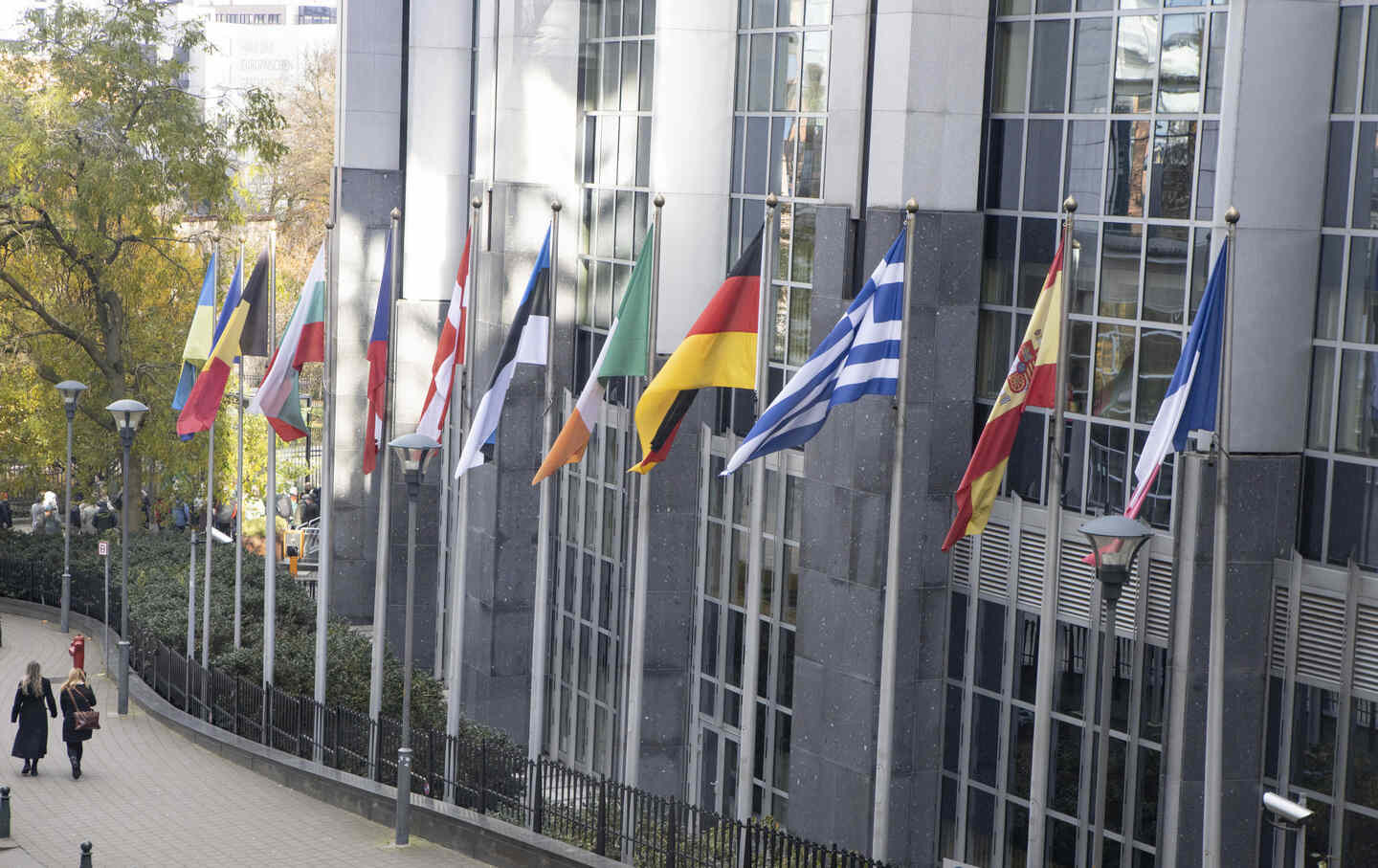American Evangelicals Await the Final Battle in Gaza
For some believers, the news from the Middle East is a prelude to Armageddon and Rapture.

Texas evangelist John Hagee of Christians United for Israel addresses a crowd of his followers and Israeli supporters at a rally at the Jerusalem convention center.
(Sebastian Scheiner / AP Photo)For most observers, the war in Gaza is a horrifying escalation of tensions in the Middle East, pitting a heavily armed Israeli state in a self-styled “existential” crusade against a stateless civilian population, bringing a brutal toll of casualties and the prospect of permanent displacement. Yet for many in the American evangelical world, the news out of Gaza is a crucial foretaste of redemption—the prelude to the final battle for earthly power, to be followed by Armageddon and the Rapture.
American evangelicals have long prided themselves on their undeviating support for Israel—but the basis of this alliance is not a standard convergence of diplomatic interests, and it’s certainly not a flourish of faith-based solidarity with the Jews. Instead, it’s a matter of the opportunistic choreographing of the foreordained final act of history. Believers in the literal interpretation of “endtimes” prophecy see the fortunes of Israel as a key harbinger of the Final Judgment and the elevation of fallen human history into the realm of the divine. In secular leftist politics, advocates of rapid escalation of class and geopolitical conflict are known as accelerationists; in endtimes prophecy belief, acceleration is left to God, but his Christian emissaries still retain the awesome power of recognizing and celebrating the signs of the pending judgment—and urging earthly powers and principalities to get in line with the divine plan before it’s too late.
The best-known promoter of this worldview is Texas-based Pentecostal televangelist John Hagee, the founder of the advocacy group Christians United for Israel (CUFI). Hagee is a longtime fixture in the endtimes media complex, claiming that the march of time is rapidly aligning with the events foretold in Revelation and other prophetic books of the Bible. After Hamas’s October 7 terrorist attack on Israel, he took to his pulpit at his Cornerstone Church in San Antonio to urge immediate US intervention against Iran, as several Israeli diplomats looked on, and right-wing members of Congress offered taped testimonials of their own.
“The righteous rage of America must be focused on Iran,” Hagee announced, as journalist Lee Fang, who recently released a documentary on the evangelical-Israeli alliance called Praying for Armageddon, reports. “Let me say it to you in plain Texas speech: American should roll up its sleeves and knock the living daylights out of Iran for what they have done for Israel. Hit them so hard that our enemies will once again fear us.” Hagee’s son and co-pastor, Matt Hagee, took up the same refrain in lurid prophetic language. “The secretary of state is not going to get us out of this one,” he declared in a burst of self-satisfied scriptural omniscience. “God has a hook in the jaws of these nations, and he’s drawing them here. God tells Ezekiel exactly how he’s going to defend Israel. He speaks about raining down fire and hail and brimstone. That’s a heavenly air assault.”
The Hagees’ brand of bloodthirsty dispensationalism has been an extension of mainstream prophecy belief at least since the 1970s, when the pop endtimes tract The Late Great Planet Earth, by Hal Lindsay, emerged as the best-selling nonfiction book of the decade. That breathless account of contemporary world events maintained that the generation that saw the formation of modern Israel would be the last on Earth—placing the advent of the apocalypse somewhere around 1988. It didn’t matter that Lindsay’s earnest calculations of the Last Judgment’s arrival were woefully misguided—as with past failed endtimes predictions, the point was to rouse the mood of impending global reckoning, and shock believers into action. The same fill-in-the-blanks fusion of biblical prophecy and current events fueled Tim LaHaye and Jerry Jenkins’s Left Behind series of evangelical endtimes novels, which has the final battle take shape in the Middle East as a shifty UN secretary general seeks to broker a faithless peace and is revealed to be the Antichrist. Like Lindsay’s tract, the Left Behind franchise was a huge commercial success, racking up nearly 80 million in sales.
Hagee’s fulminations may strike the uninitiated as little more than street corner ranting, but he has enlisted one very influential spiritual ally—Israeli Prime Minister Benyamin Netanyahu, who has spoken at several major CUFI events and sat for an interview with Hagee on the eve of his election victory last fall. Hagee also was among the prominent evangelical leaders who successfully lobbied the Trump administration to move the American embassy in Israel to Jerusalem—another endtimes portent that Hagee himself underlined as he gave the closing benediction at the ceremony for the new embassy and proclaimed that Jerusalem was “the eternal capital of the Jewish people.”
The Likud leader’s embrace of Hagee’s endtimes message is less a question of spiritual affinity than a brute reckoning with the rise of this hard-core brand of Christian nationalism to unprecedented political influence in America. Donald Trump’s 2016 election helped to move the evangelical right into the vanguard of Republican politics—while Trump brokered key points of contact between American evangelicals and Likud leaders, such as the embassy move and the failed diplomatic framework of the Abraham Accords. “The reason for Netanyahu to realize how important evangelicals are is clear, since their political influence has done nothing but grow in the last 20 years, especially within Congress,” says Washington State University historian Matthew Avery Sutton, author of American Apocalypse, a study of modern prophecy faith. And as the pronouncements of Hagee and his son make clear, the evangelical right, unlike many other religious Americans, has zero interest in a negotiated settlement to the Israeli occupation. “In their ideal world, there would be no two-state solution, no Palestinian state,” Sutton notes. “The idea is that Jews should control the entire land that King David controlled.”
But granting Jews unilateral control over the Occupied Territories is not by any means an endorsement of Jews qua Jews. In the dispensationalist schemes of Hagee and other endtimes preachers, Jews are a means to an end—the efficient cause of the final conflagration, but not autonomous spiritual agents in their own right. Hagee indeed has compiled a long record of antisemitic statements, including the claim that Hitler and the Holocaust represented the work of divine Providence since they culminated in the creation of Israel. (In another demented outburst, Hagee also characterized Hitler himself as “a half-breed Jew.”) “You can be both pro-Zionist and antisemitic in this context,” Sutton says. “You can believe that the Jews should be in Palestine, but that doesn’t mean you’re actually supporting them. That was a hard thing to discover as a historian—that in the 1930s, American fundamentalists could be antisemitic and worried about the plight of Jews in Nazi Germany.”
The scriptural certainties that draw believers to endtimes prophecy in the first place feed off the spread of violence and mayhem. Lee Fang reports that several prominent evangelical preachers are already warning their audiences that anyone trying to broker a cease-fire or peace agreement in the Gaza war could well be the Antichrist, just like in the Left Behind novels. With the prospect of escalating conflict in the region, evangelicals “are not going to waver on the idea that this is Jewish land, and that God has destined Israel to be a Jewish state,” Sutton says. “There’s a willingness to keep going, once you ratchet up the violence and war and get the apocalyptic juices flowing. I think they’re going to go all for Israel as a whole, and be even greater champions for expansion of the settlements and further occupation. Because they believe if they do this, God will bless them, and bless the United States.”
This latter sentiment comes from an allied evangelical tradition of pro-Zionism known as “blessings theology,” which hinges on God’s pledge to Abraham in Genesis that he will “bless those who bless you and curse those who curse you”—a brand of seed-faith prosperity doctrine projected onto the world stage. It’s also clearly a central article of faith for new House Speaker Mike Johnson, an ardent evangelical who stresses the centrality of his religious beliefs in his politics. Addressing the Republican Jewish Coalition in Las Vegas, Johnson reiterated his opposition to a cease-fire in Gaza, proclaiming that “God will bless the nation that blesses Israel.” He also appealed, not so tacitly, to the logic of endtimes prophecy as he declared that “God is not done with Israel.” Clearly, the same goes for American evangelicals.








